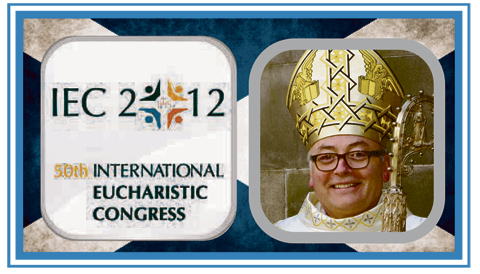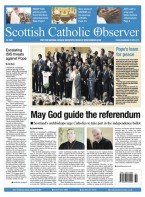June 15 | ![]() 0 COMMENTS
0 COMMENTS ![]() print
print

LIVE BLOG FROM IEC 2012—Day 5 Thursday: Cardinal Turkson and Cardinal Brady on day of reconciliation; Irish rain and Mass
Auxiliary Bishop Stephen Robson, Scotland's newly ordained bishop, blogs on the 50th International Eucharistic Congress in Dublin. This post includes extracts from Cardinal Bardy’s homily on clerical abuse in which he said: “I want to take this opportunity… to apologise for the times when some of us were blind to your fear, deaf to your cries and silent in response to your pain.”
At the beginning of the Mass yesterday afternoon all I heard was the voice of a Scottish pilgrim. She didn’t see me: “In the name of ‘o the wee man, she said, I’m fair drookit!” The rain poured from the heavens all through yesterday afternoon’s Mass, but the atmosphere was fantastic, the music beautiful and the homily truly inspiring. More about the Mass later!
Liturgy of Lament
The day began with our transfer to the Royal Dublin Society showground. At first all seemed quite quiet—but not a bit of it! Once we reached the large arena where most of the Liturgies take place we could see a sea of faces.
The Liturgy yesterday morning was a Liturgy of Reconciliation, a quiet, meditative and musical Liturgy of the Word with time to meditate on each of the readings from Sacred Scripture.
There was a pair of ‘triplets’—each containing a reading from Sacred Scripture and a Psalm and a Gospel—to reflect on. The first triplet of readings was especially poignant, reflecting as it did on the innocence of children, and the Liturgy of Lament, which followed, brought tears to the eyes as the Church reflected on the shattered innocence of children damaged as a result of abuse—sexual and physical.
The second triplet reflected on abuse of the planet God’s creation.Our thoughts were then turned to the harsh judgements we sometimes make of others and our refusal sometimes to show hospitality to the stranger and intolerance towards people of other faiths.
Cardinal Turkson’s homily
The homily was given, and the meditation led, by Cardinal Peter Turkson, president of the Pontifical Commission for Justice and Peace. He illustrated most powerfully the effect that even the most seemingly inconspicuous of sins can have on others. But then he showed how powerfully the forgiveness given to the greatest of sinners not only frees them from the prison of sin and guilt but also the victim can be freed from the prison of hurt and the ways in which failures to forgive on our part can turn us to stone and render us unable to receive the Lord’s forgiveness.
His illustration was that of a woman whose family members had been killed during the massacres of the Rwandan war who realised that she was as imprisoned in bitterness and refusal to forgive as the prisoner she was confronted by who had murdered her father, a neighbour whom she had loved and trusted in the past.
After a celebration of repentance we were all encouraged to celebrate the Sacrament of Confession in the Prayer Space a huge building set up as a space for adoration of the Blessed Sacrament. Confessions were heard in many languages and reconciliation sought in Christ’s love and forgiveness—a reversal of the confusion of Babel and the alienation from others that sin brings us.
One beautiful touch was an Examen and Prayer for Protection using material from a 11th century Irish Penitential which encouraged us to examine our use of our senses and our faculties and the gift of our physical bodies to abuse them and lead us to sin.
After the Liturgy drew to a close we began to realize how many people were present from all over Ireland and indeed from all over the world. Everywhere was crowded. The eating places, the Exhibition Halls, the Sacred Space reserved for Adoration of the Blessed Sacrament. Most of the workshops ewer grossly over-subscribed. The largest workshop venue had been reserved for the Talk on Reconciliation given by Fr Timothy Radcliffe OP. His talk had to be repeated and transmitted on the giant television screens because of such a gigantic demand to hear him.
I attended a wonderful talk on the missionary activity of the Irish monks—who mainly followed the Rule of St Columbanus—who had evangelised many of the forgotten areas of Europe and especially of the Northern Plains of Italy in the VII, VIII and IXth centuries. The talk was given in Italian and the workshop was again, full.
Mass and Cardinal Brady
The Mass in the afternoon referred to above was—wet! But fantastic! About seven cardinals, 150 bishops and many hundreds of priests concelebrated the Mass with about 40,000 of the faithful. The stadium was well full.
The Mass was also the Irish language thing today! Yes, the Mass was entirely (except for some of the music) in Irish. It was beautiful but even some of the Irish pilgrims were at a loss! A lady I was beside said that when she was a child she had to learn Irish but she’d forgotten it all.
The Mass sounded wonderful but it did put the vast majority of bishops and priests and pilgrims at a disadvantage and I couldn’t help thinking that the Church would be better putting us all to the same disadvantage, on such international occasions, and celebrate the Mass in Latin—after all it is still the official language of the Church. However, let us not be too controversial! The Mass is the Mass in whatever language the Holy Sacrifice is celebrated!
I have described above the nature of the celebration, but the homily, given by Cardinal Sean Brady, was masterful—and so apt. In it he unreservedly apologised for the ways in which some in the Church had stolen the innocence of the young and how some of the leaders of the Church had reacted too slowly and inadequately to the crises. He humbly prayed for the advent of a forgiving Church and a healing church and a humble Church. He said just the right things and said them rightly. The atmosphere was electric and spontaneous applause broke out at the end of the Mass. It was a wonderful, inspiring occasion.
I’d love to share with you just a snippet of Cardinal Brady’s homily:
“My dear friends, there are few of us in whom the story of the lost sheep does not find an echo. Who among us has not gone astray at some moment in our lives? Who among us has not chosen our own path rather than the Lord’s? Who among us has not experienced the pain of separation or loneliness? Who among us does not know what it is to be afraid? Who among us does not carry the burden of regret for past wrongs?
“How easy it can be to forget God’s commandments and to live as though God does not exist. When we sin, we distort God’s image within us, the image and likeness, in which we are made. Sin is not a very popular word in our culture. Evil is often thought of as something rare and extreme, if it is believed to exist at all. Yet history tells us time and time again, that a loss of a sense of sin, or the belief that evil is just an extreme to which I have no connection, can have serious consequences.
“Jesus spoke of sin as something that causes us to stumble, something that trips us up on the journey of life. It suggests the image of a loose stone on a path, or a jagged rock on a mountain climb. It reminds me of this stone which I have in my hand. It is a small stone. Yet if this stone could speak it would tell a story of the most incredible and dramatic evil. It would tell of how it felt the cold, weary feet of frightened children, women and men of every age as they were walked to their death at Auschwitz, where this stone was found. This stone reminds me of how the simple idea, that ‘God is dead’, had enormous and profoundly evil consequences. The philosopher Nietzsche put it forward. It later gave rise to the evil idea that a whole race of people should be eliminated, the consequences of which were one of the most tragic events in human history.
“There is a much larger stone that sits in a place of honour here before this altar. It will serve as a reminder of those children and young people who were hurt by a Church that first betrayed their trust and then failed to respond adequately to their pain. The words of the Gospel echo in my mind: ‘It is not the will of your Father that any of these little ones should be lost’. May God forgive us for the times when we as individuals and as a Church failed to seek out and care for those little ones who were frightened, alone and in pain because someone was abusing them. That we did not always respond to your cries with the concern of the Good Shepherd is a matter of deep shame. We lament the burdens of the painful memories you carry. We pray for healing and peace for those whose suffering continues.
“I want to take this opportunity of the 50th International Eucharistic Congress to apologise for the times when some of us were blind to your fear, deaf to your cries and silent in response to your pain. My prayer is that one day this stone might become a symbol of conversion, healing and hope. I hope it will become a symbol of a Church that has learned from the mistakes of the past and strives to become a model for the care and well being of children. What this stone represents, what has happened in the Church in Ireland and in other places in the world, is a stark warning to all that there can be no passing by on the other side, no room for half-heartedness in our care for the vulnerable and the young.
“Every celebration of the Eucharist is indeed a ‘truly remarkable proof of the ultimate triumph of good over evil’. Every Eucharist rolls away that heaviest of all stones, the stone in our heart that keeps us back from friendship with Christ and with one another. Every Eucharist proclaims ‘Christ is risen—Our God is alive!’ He lives in you and in me. Through His Holy Eucharist he continues to reconcile us to one another. In the memorial of his passion and death, made present in every Eucharist, he continues to reconcile the whole world to himself. Let us therefore be reconciled with God. Let us bring that reconciliation to others. For in this is our peace; in this lies the greatest hope for our world.
— Auxiliary Bishop Stephen Robson is the Bishops’ Conference of Scotland’s national delegate for the 50th International Eucharistic Congress. He was ordained Auxiliary Bishop of St Andrews and Edinburgh on June 9 2012 before heading to IEC 2012.











